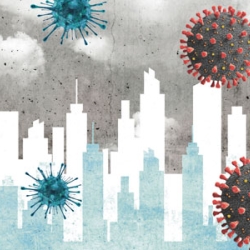IAALS' Discovery Protocols Provide Clarity to Courts in Times of Emergency
 September is National Preparedness Month, and with natural disasters increasing in severity—and with COVID-19 still wreaking havoc worldwide—it is important for courts to consider ways to mitigate the negative effects.
September is National Preparedness Month, and with natural disasters increasing in severity—and with COVID-19 still wreaking havoc worldwide—it is important for courts to consider ways to mitigate the negative effects.
Disasters have consequences that extend far beyond immediate destruction. As individuals and businesses deal with property damage from natural disasters or face months of lost profits due to a public health emergency, they may end up in court disputing coverage or other issues, which can result in extensive and complex delays during an already stressful time.
Courts already have many of the tools they need to improve this process: IAALS' Disaster Protocols and Pandemic Protocols. These pattern discovery protocols, tailored to these specific types of emergency cases, provide steps for both parties and the court to take, including automatic initial disclosure of specific documents and information—making the overall discovery process more efficient and more targeted.
Disaster Protocols
IAALS' Disaster Protocols are designed for first-party insurance property damage cases arising from disasters, like fires and hurricanes.
Over the past 50 years, the number of natural and man-made disasters has been on the rise, with devastating effects on communities across the country. That's why, in 2019, IAALS developed initial discovery protocols for disaster cases—a category of cases with a consistent set of information that both parties exchange. The protocols were developed with the assistance of nationally renowned attorneys from all perspectives—including plaintiff and defense, FEMA, the Texas U.S. Attorney's office, and state and federal judges.
The Disaster Protocols make it easier and faster for the parties and their counsel to:
- Exchange important information and documents early in the case;
- Frame the issues to be resolved;
- Value the claims for possible early resolution; and
- Plan for more efficient and targeted subsequent formal discovery, if needed.
"With Florida's hurricanes, we see the real impacts of natural disaster litigation on people's lives. Delay in the resulting civil cases impacts not only individuals, but community-wide recovery," said Judge Jennifer Bailey of Florida's 11th Judicial Circuit in 2019, when the protocols were released. "These protocols serve as an innovative tool to deal with the high volume of cases that follow the storm's path."
Courts and judges around the country are turning to these and other disaster-related protocols:
- The United States District Court for the Southern District of Texas adopted the Disaster Litigation Initial Discovery Protocols, where Chief Judge Lee H. Rosenthal requires procedures in her court that parties discuss discovery protocols at the 26(f) conference to reduce or avoid discovery costs, including cases involving post-disaster first-party property insurance disputes and cases involving business-interruption insurance claims (employment matters involving adverse actions and FLSA claims are also included in her procedures).
- The United States District Court for the Eastern District of New York adopted in 2014 the initial discovery protocols in its case management order for Hurricane Sandy cases.
- The United States District Court for The Western District of Louisiana issued Case Management Order No. 1 in 2020 for insurance cases stemming from Hurricanes Laura and Delta filed in the Lake Charles and Lafayette Divisions, including a case management order with disaster protocols.
Pandemic Protocols
With similar goals to the Disaster Protocols, IAALS' Pandemic Protocols—for cases involving first-party insurance business interruption and related coverage claims—help businesses and insurers move through the litigation process more efficiently when disputes arise stemming from pandemics and other public health threats.
At the onset of the COVID-19 pandemic, as businesses nationwide looked to their insurance policies for relief and insurers were subsequently inundated with coverage claims, IAALS brought together a working group of experienced attorneys and judicial leaders who have used IAALS' protocols in their courts to create a new set of pattern discovery protocols. In an effort to respond to both the immediate need for clarity in these cases, as well as to get ahead of the inevitable case backlog caused by courthouse closures, IAALS released the Pandemic Protocols in record time.
The protocols provide a streamlined process for documents to be automatically disclosed by both sides within a certain timeframe, including documents about coverage disputes and valuation disputes, for more efficient and targeted subsequent discovery, if needed. Business interruption lawsuits across federal and state courts are now in the discovery (or appeal) stages, and these protocols can be vitally important to moving litigation along more swiftly. Because of the unique nature of COVID-19 business interruption insurance litigation, participating courts may implement these protocols but defer automatic disclosure of information pending a decision on a motion to dismiss.
"These protocols are the latest in a set of discovery tools to help judges and lawyers resolve a high number of certain categories or types of cases in state and federal courts. Because lawyers on both sides of the 'v.' were involved in developing the protocols, the obligations are balanced and fair. The lawyers and parties can get critical information they need earlier and faster," said Judge Lee H. Rosenthal, Chief Judge of the United States District Court for the Southern District of Texas, Houston Division, at the time of the protocols' release.
"As we look at the backlogs COVID-19 has created in our case loads, a set of protocols that work to improve the process for the parties, the attorneys, and the courts is much needed."
Disasters are vicious—but civil litigation doesn't have to be. By using these pattern discovery protocols, courts, lawyers, and litigants can limit discovery disputes, curtail gamesmanship, and sort out cases efficiently to bring clarity and resolution to both parties.






